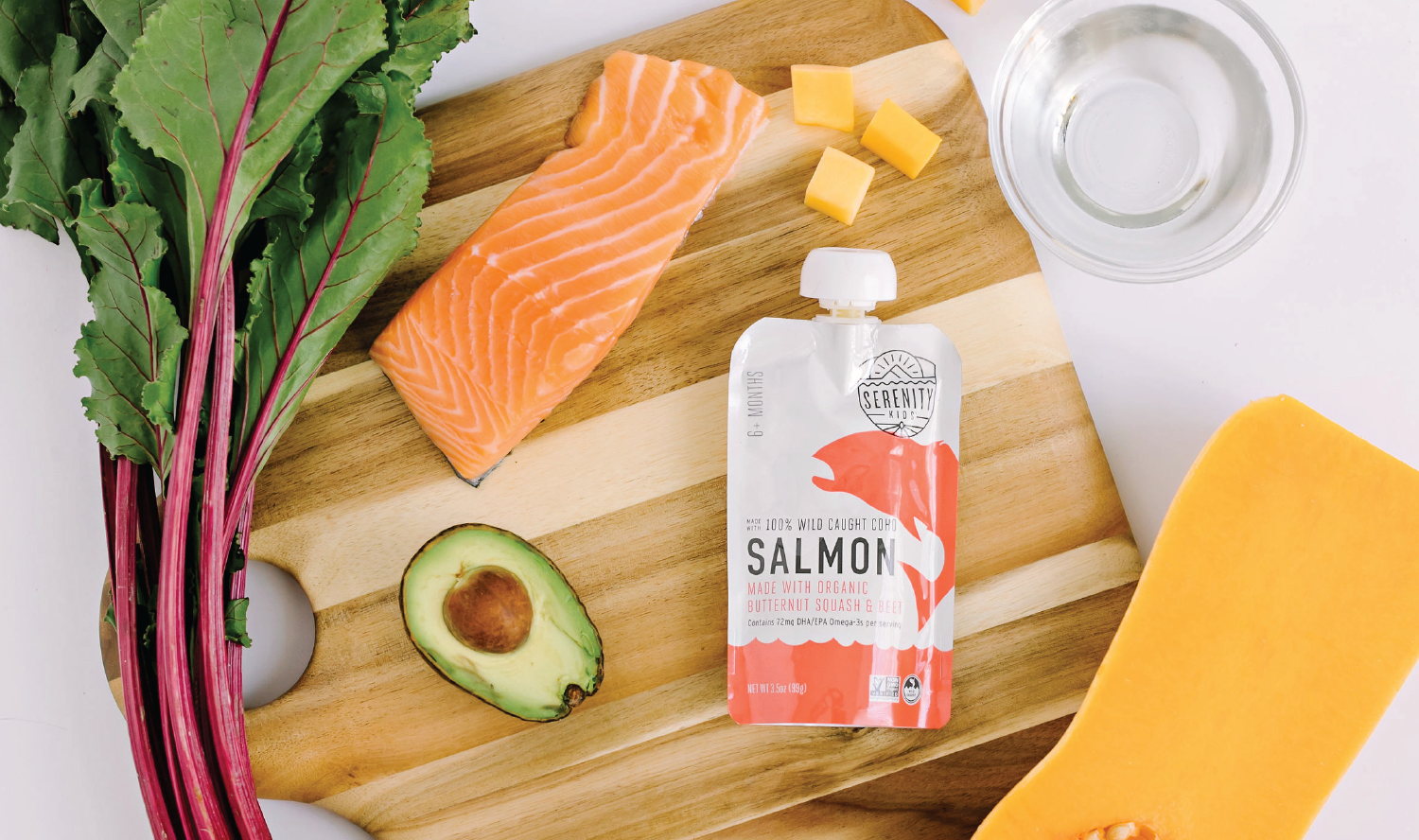TABLE OF CONTENTS
Written by Hillary Bennetts
February 02, 2020
Importance of DHA for Baby Brain

By: Hillary Bennetts
The first years of a child’s life involve rapid growth and development. Several nutrients are necessary to support different aspects of your little one’s development, but one in particular is the star when it comes to baby’s brain: DHA.
So what is DHA?
DHA, or Docosahexaenoic acid, is an omega-3 fatty acid that plays a critical role in the brain’s ability to communicate with the rest of the body through neural signaling. The brain is composed of about 60% fat and 20% of that is DHA!
Why is DHA important?
DHA is essential for the brain health of all humans. It helps to form the myelin sheath (the nerves insulation) and supports the blood-brain barrier (a layer of cells surrounding the brain that keeps harmful substances out while allowing vital nutrients in).
But while important for all ages, DHA is particularly critical for infants and children (as well as pregnant and breastfeeding women). This is due to DHA’s role in the development of an infant’s cerebral cortex. The cerebral cortex is the part of the brain responsible for motor function, language and sensory processing, and higher-level thinking required for decision and information analysis. This development occurs most rapidly between the beginning of the third trimester of pregnancy and age two.
The direct implications of inadequate availability of DHA during this timeframe are unclear, but the impact of DHA on developing the foundational structure and functions of the brain is well-researched. Whether a child receives adequate DHA in early life can have lasting implications for their long-term development. In fact, a 2015 study by the University of California - Irvine found that dietary deficiencies in the type of fatty acids found in fish and other foods can limit brain growth during fetal development and early in life. In addition, lower levels of DHA have been found in people diagnosed with autism spectrum disorders and ADHD.
Where do you get DHA?
As noted earlier, DHA is one of the three omega-3 fatty acids (the other two being Eicosapentaenoic acid, or EPA and Alpha-linolenic acid, or ALA). All omega-3s are essential fatty acids. That means that the human body cannot make them, it must get them through food.
DHA is found only in animal foods. There are indeed plant foods that contain other omega-3 fatty acids, like walnuts and flax seeds. However, it comes in the form of ALA. And while DHA can be synthesized from ALA, the process is inefficient. In fact, most studies conclude that less than 10% of ALA is converted into DHA in the body.
Your best best? Go straight to the animal source — ideally fatty fish, such as salmon and sardines. Or for breastfed babies, mama! However, it is important to note that in order to obtain adequate DHA from breast milk, mama must be consuming enough in her diet (remember, she can’t make it herself). If you’re curious about your levels, you can order a test from Vital Choice.
Once solids have been introduced, Serenity Kids salmon pouches are a good source of DHA. Serenity Kids uses Wild Alaskan Keta salmon from Virgin Bay Seafood Company. This particular salmon is nutritionally excellent thanks to the environment in which it lives and is caught. The fish swim freely and eat a marine die their entire lives and are caught at the mouth of the Yukon River, just before beginning their 2,300-mile migration. At this stage in their lives, they’ve built up immense stores of fat for the journey, which translates into fish containing the highest concentration of omega-3s of any fish on the USDA database. A Serenity Kids salmon pouch has 60mg of total omega-3s (EPA and DHA) and 52mg of DHA.
How much DHA is recommended?
The next logical question that you’re probably now asking is, “so how much do we need?” Well, unfortunately, there are no official US intake recommendations for DHA. However, the International Society for the Study of Fatty Acids and Lipids (ISSFAL) has established the following recommended amounts for both DHA and EPA. Note that these are minimum values and there is extremely little risk of too much DHA in otherwise healthy humans, so aim for at least these levels and feel confident in consuming more as you like.
- Infants (1–18 months): 0–15 lbs: 32 mg/lb EPA+DHA
- Children (1.5–15 yrs): 15 mg/lb EPA+DHA
- Adults (15–115 yrs): 500 mg EPA+DHA (with a minimum of 220 mg EPA and 220 mg DHA)
- Pregnant and Lactating Women: 300 mg DHA daily
What if my kid hates fish or I can’t eat that much fish?
I get it, fish can be an acquired taste. And it can be particularly hard to get in while pregnant and during the busy postpartum days, or while navigating the ever-changing preferences of your child. So what do? Take a high-quality supplement! Here are some I use and recommend due to their purity standards and stringent third party testing:
- For both baby and mama: Rosita Extra Virgin Cod Liver Oil and/or Vital Choice Sockeye Salmon Oil (I just put in a medicine dropper for my son and squirt it into the side of his mouth. Mamas can also take the softgels.)
- For infants: Nordic Naturals Baby’s DHA
- For kids over age 1 (flavored if you’ve got a kiddo resisting Rosita or Vital Choice): Nordic Naturals Children's DHA Xtra
In addition to supplementing, you can also pay attention to your intake of omega-6 fatty acids, as a lower level has been shown to increase the availability of omega-3s in the body.
The Bottom Line
Bodies and brains need DHA, and fatty fish is the best way to get it. Incorporate fish into your family meals, try the Serenity Kids salmon pouches, and supplement as needed!
Sources:
https://www.sciencedaily.com/releases/2015/04/150415133314.htm
https://www.psychologytoday.com/us/blog/diagnosis-diet/201903/the-brain-needs-animal-fat
https://www.ncbi.nlm.nih.gov/pmc/articles/PMC6267444/
https://www.ncbi.nlm.nih.gov/pubmed/24675168
https://americanpregnancy.org/pregnancy-health/omega-3-fatty-acids-faqs/

Hillary Bennetts provides nutrition consulting services to individuals and businesses. Hillary holds a BA in Economics from Washington and Jefferson College, an MBA from Emory University, and an NC from Bauman College. A marathoner, mountain climber, and mama, she lives in Colorado with her husband, son, and golden retriever.
You Might Also Like
· 1 min read · Recipes
· 7 min read · Education


















































